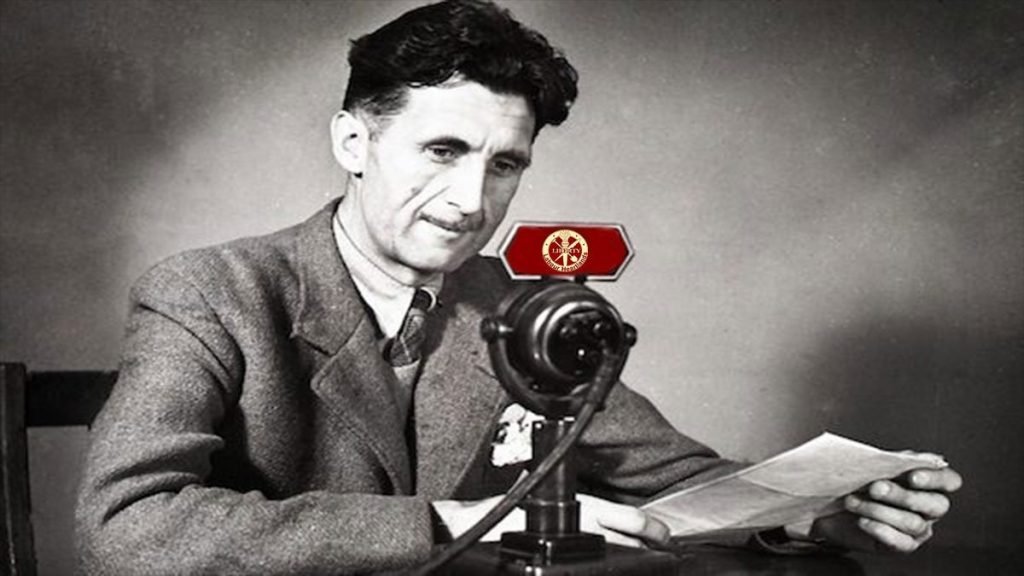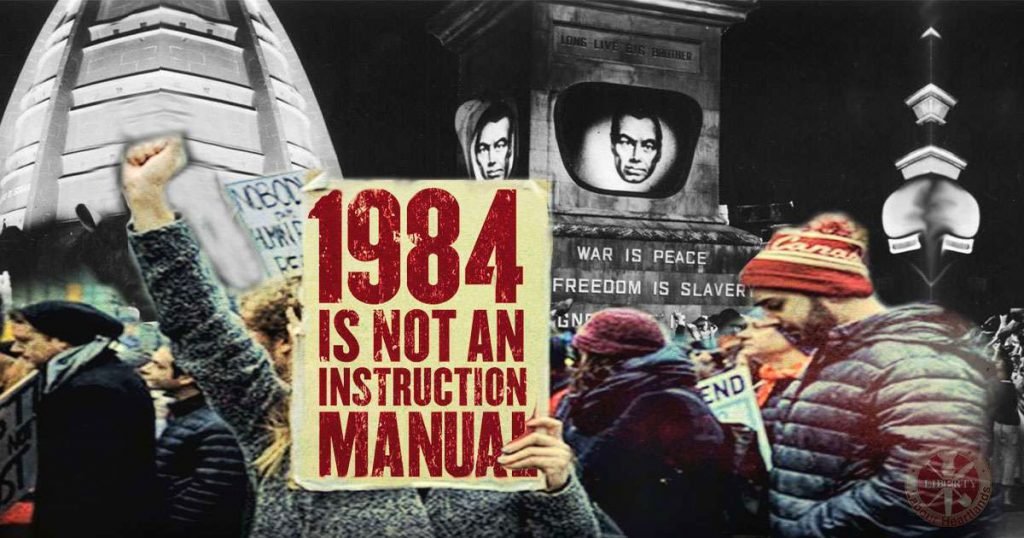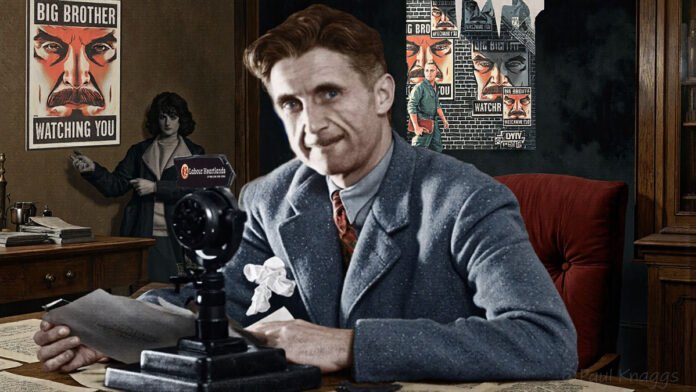Love, Death, and the List: In Defence of “George Orwell was a Snitch”
How a dying man’s love for truth and a woman became history’s most misunderstood act in defence of democratic socialism
Was George Orwell a government snitch? The accusation hangs in the air like cigarette smoke in a Fitzrovia pub, acrid and persistent, repeated so often it’s mistaken for fact. Seventy-five years after a dying author handed thirty-eight names to a beautiful woman in a Cotswold sanatorium, we’re still trapped in the same lazy caricature: the visionary who warned us about thought police, we’re told, became Big Brother’s willing accomplice.
It is, quite simply, a lie. And it is time we buried it, not merely for Orwell’s sake, but for our own. Because in discrediting the messenger, we risk ignoring a message that grows more urgent with each passing day: that the manipulation of truth, the redefinition of reality, and the rapid slide toward authoritarianism can happen anywhere, even in the freest societies. Especially in the freest societies, especially in our own…
The Anatomy of a Slander: Love, Loss, and the Labour Government

Let us transport ourselves to March 1949. George Orwell, or Eric Blair as he was known to those who loved him, lay wasting away in a Gloucestershire sanatorium. Tuberculosis, that cruel and unyielding assailant, was tightening its grip. The man who had fought fascists in Spain and totalitarians in prose was facing his final battle, against time itself. He had months to live, perhaps weeks.
Into this twilight scene stepped Celia Kirwan, a strikingly beautiful, vivacious woman who moved in left-wing literary circles, sister-in-law to the Hungarian polymath Arthur Koestler, and, significantly, an old flame. Orwell, a man deeply marked by loneliness since the death of his wife Eileen in 1945, had, rather touchingly and perhaps clumsily, proposed marriage to Kirwan years earlier. She had, with a gentle ambiguity, declined. Yet, a bond remained.
Crucially, Celia Kirwan was not merely a friend; she worked for an organisation that would become central to this enduring controversy: the Information Research Department (IRD). And here, dear reader, is where the critical analysis so often falters, where the narrative of Orwell’s alleged perfidy begins its wilful deviation from fact. The IRD was not some clandestine outfit of MI5 or a shadowy Conservative plot.
It was an agency established in 1948 by Clement Attlee’s Labour government. Yes, the same democratic socialists who laid the foundations of our National Health Service and built the post-war welfare state created it. Foreign Secretary Ernest Bevin, a man deeply aware of the Soviet Union’s burgeoning propaganda machine, understood that ministerial speeches alone wouldn’t suffice to counter the Kremlin’s immense capabilities. The IRD’s mandate was clear: to promote democratic socialist values and resist Soviet totalitarianism, advocating for a “Third Force” — a progressive alternative to both Soviet communism and American capitalism.
What Was the IRD? The Labour Government’s Anti-Totalitarian Crusade

Here is what Orwell’s critics systematically ignore: When Kirwan visited Orwell, discussing the IRD’s work “in great confidence,” he was, as she later recalled, “delighted to learn of them, and expressed his wholehearted and enthusiastic approval of our aims.” For a man who had witnessed the grim reality of Stalinist purges, who had seen the Spanish Republic betrayed by communist perfidy, this was not collaboration with an enemy. It was, rather, a profound vindication of his lifelong struggle against totalitarianism in all its guises.
This was not some shadowy intelligence operation designed to persecute British leftists. The IRD was tasked with promoting democratic socialist values.
The List: A Cautionary Tale, Not a Denunciation
Here is what happened, stripped of seven decades of deliberate misrepresentation: In April 1949, Orwell wrote to Celia Kirwan. In his letter to Celia dated 6 April 1949, written in shaking handwriting because “I can’t use the typewriter even now,” Orwell offered what would become his most controversial legacy: “I could also, if it is of value, give you a list of crypto-communists, fellow-travellers or inclined that way and should not be trusted as propagandists.”
The word “propagandists” is crucial. Orwell was not suggesting these individuals be arrested, surveilled, or silenced. As Celia Kirwan herself confirmed in 2003: “the only thing that was going to happen to them was that they wouldn’t be asked to write for the Information Research Department.” He was advising a Labour government propaganda unit on which writers could be trusted to genuinely oppose Soviet totalitarianism rather than excuse it.
This was not the paranoid delusion of a dying man, but the careful political analysis of someone who had learned, through bitter experience in Spain, through watching the Soviet purges destroy genuine revolutionaries, through observing how Communist parties across Europe had betrayed democratic movements, that in the battle between freedom and tyranny, knowing your allies from your useful idiots was a matter of survival.

Orwell’s notebook, from which these names were drawn, contained 135 individuals, meticulously compiled since the mid-1940s. This was no fevered denunciation from a dying man, but the sober, forensic work of a political writer who understood that intellectual honesty demanded clarity in a world teetering on the brink of ideological conflict. His prescience was chilling: Peter Smollett, whom Orwell noted as “probably agent,” was later confirmed by MI5 as a Soviet spy. Desmond Bernal, described as “definitely a Communist, possibly a spy,” was indeed a committed Communist, later suspected of espionage. Orwell’s assessments, dismissed by some as paranoid, proved devastatingly accurate.
Perhaps the most poignant detail, one that strips away any notion of vindictiveness, is Orwell’s inclusion of his own late wife, Eileen O’Shaughnessy, on the list, with the note “probably sympathetic” to communists. Is this the act of a malicious informant? Or is it the heartbreaking integrity of a man utterly devoted to truth, even when it touched those he loved most deeply?

The irony is almost unbearable: the author of Nineteen Eighty-Four, having spent his literary life warning against the manipulation of truth, was in his final months accused of practising exactly that manipulation. Yet Richard Rees, who discussed the names with Orwell, later described it as “a sort of game we played, discussing who was a paid agent of what and estimating to what lengths of treachery our favourite bêtes noires would be prepared to go.” This was not malicious gossip but the careful political analysis of a man who had learned, through bitter experience in Spain and beyond, that not all who claimed to fight fascism were genuine democrats and some were just useful idiots.
Who Was on the List?
Sample Names & Orwell’s Reasoning
| Name | Orwell’s Notes | Reality |
|---|---|---|
| Charlie Chaplin | “Sympathizer” | Chaplin was openly left-wing but never a Stalinist. Orwell likely meant he was too soft on the USSR. |
| J.B. Priestley | “Fellow traveller” | Priestley was a Labour supporter, not a Communist, but Orwell thought he downplayed Soviet crimes. |
| E.H. Carr | “Appeaser” | Carr was a historian who defended Soviet foreign policy—hardly a secret. |
| Peter Smollett (aka Peter Smolka) | “Probably agent” | Later confirmed as a Soviet spy (MI5 file: “Agent AB/1”). Orwell was right. |
Why the Lie Persists: The War Against Orwell’s Warning

Why, then, does this slander endure? The answer, I believe, lies in the convenient utility of the lie. From the earliest days of the Cold War, the KGB and its ideological fellow-travellers in the Western left deliberately distorted Orwell’s actions. To paint the author of Animal Farm and Nineteen Eighty-Four as a “traitor to socialism” was a calculated act of character assassination, a desperate attempt to neutralise the devastating intellectual blow his work delivered to the Soviet narrative.
More recently, certain elements of the contemporary left have found renewed purpose in this myth. By portraying Orwell as a state collaborator, they seek to discredit the anti-Stalinist tradition within socialism, making it easier to downplay the historical crimes of authoritarian communist regimes. Publications like The Morning Star and its ideological brethren have seized upon “Orwell’s List” as a convenient cudgel against the inconvenient truth-teller, whose unflinching honesty exposed their revolutionary fantasies as totalitarian nightmares. It is a cynical manoeuvre, designed to silence critical inquiry and whitewash the darkest chapters of what purports to be progressive thought.
But there is a deeper, more urgent reason why discrediting Orwell has become so fashionable today. His vision of a world where “the Party told you to reject the evidence of your eyes and ears” feels less like historical fiction and more like current events with each passing year. We live in an era of “alternative facts,” where truth itself has become a partisan concept, where surveillance capitalism harvests our data while promising convenience, where algorithmic manipulation shapes our reality while masquerading as personal choice.
The techniques Orwell described, the memory hole, doublethink, newspeak, the Two Minutes Hate, no longer seem quaint relics of a totalitarian past but urgent warnings about a possible future. Today, it’s more than convenient to slander Orwell; it’s essential for those who would prefer we not notice how perilously close Britain has drifted toward the dystopian nightmare his books envisioned. Those who benefit from the manipulation of truth have found in “Orwell’s List” the perfect weapon against the inconvenient truth-teller who saw it all coming.
The Democratic Socialist’s Dilemma

As historian John Newsinger observed, Orwell’s cooperation with the IRD was “a terrible mistake on his part, deriving in equal measure from his hostility to Stalinism and his illusions in the Labour government.” Yet even Newsinger acknowledges that “what it certainly does not amount to is an abandonment of the socialist cause or transformation into a foot soldier in the Cold War.”
This nuanced view captures the tragic complexity of Orwell’s final months. Here was a man who had spent his life fighting for democratic socialism, who believed passionately in the possibility of a society both free and equal. When approached by representatives of a Labour government claiming to share those values, he chose cooperation over cynicism. That the IRD would later engage in the kind of black propaganda operations Orwell himself would have condemned does not retroactively invalidate his decision to trust his comrades in the cause of democratic freedom.
Truth Over Tribe: Orwell’s Final Lesson for Today’s Fractured Left
The true tragedy of the “Orwell as snitch” myth is how it obscures the profound lessons of his final act. In providing his list to Celia Kirwan, Orwell demonstrated the same unwavering commitment to truth that defined his entire career. He was not advocating for repression, but for intelligent discernment. He understood that in the battle for hearts and minds, one must know one’s true allies from those who, wittingly or unwittingly, serve the enemy.
This was the same intellectual honesty that compelled him to write Homage to Catalonia, despite knowing it would alienate many on the left. It was the same moral courage that produced Animal Farm when Soviet sympathy was still fashionable among British intellectuals. Orwell understood that the greatest service one can render to democracy, to genuine democratic socialism, is to tell the unvarnished truth about its enemies, even when those enemies claim to speak in freedom’s name.
In the end, Orwell’s list was a testament, a final, poignant declaration of his enduring belief that truth matters more than tribal loyalty. Penned by a dying man to a woman he had loved, it represents the final flowering of a moral imagination that refused to subordinate truth to convenience, analysis to wishful thinking, or democratic principles to factional solidarity. As Christopher Hitchens so incisively put it:
“All too much has been made of this relatively trivial episode, the last chance for Orwell’s enemies to vilify him for being correct.”
George Orwell was many things: a colonial policeman who came to despise imperialism, a revolutionary who rejected revolution’s false promises, a socialist who refused to ignore socialism’s authoritarian corruptions. What he was not, emphatically not, was a government informant in any meaningful sense. He was, instead, what he had always been: a man who believed that truth, however uncomfortable, however inconvenient, remains the indispensable foundation of any society worth defending. In his final months, he offered that truth as a gift to a Labour government he hoped might build the democratic socialist future he had spent his life imagining.
That future remains tragically unrealised. The very least we can do, as inheritors of his complicated but profoundly ethical legacy, is to defend the man who died trying to make it possible, against the lies of those who would prefer their revolution without the inconvenience of truth. In defending Orwell, we defend not just his memory, but the principle that democratic socialism must be, above all, a commitment to honesty about power and its abuse, wherever we find it.
The man who gave us Big Brother deserves better than to be remembered as Big Brother’s servant. He deserves to be remembered as what he was: democracy’s troubled but faithful guardian, offering his final service not to the state, but to the ideal of a society where truth and freedom might finally learn to coexist.
That is the real lesson of Orwell’s list. That is the legacy worth defending. That and the fact he is one of my most favourite authors…
Support Independent Journalism Today
Our unwavering dedication is to provide you with unbiased news, diverse perspectives, and insightful opinions. We're on a mission to ensure that those in positions of power are held accountable for their actions, but we can't do it alone. Labour Heartlands is primarily funded by me, Paul Knaggs, and by the generous contributions of readers like you. Your donations keep us going and help us uphold the principles of independent journalism. Join us in our quest for truth, transparency, and accountability – donate today and be a part of our mission!
Like everyone else, we're facing challenges, and we need your help to stay online and continue providing crucial journalism. Every contribution, no matter how small, goes a long way in helping us thrive. By becoming one of our donors, you become a vital part of our mission to uncover the truth and uphold the values of democracy.
While we maintain our independence from political affiliations, we stand united against corruption, injustice, and the erosion of free speech, truth, and democracy. We believe in the power of accurate information in a democracy, and we consider facts non-negotiable.
Your support, no matter the amount, can make a significant impact. Together, we can make a difference and continue our journey toward a more informed and just society.
Thank you for supporting Labour Heartlands









